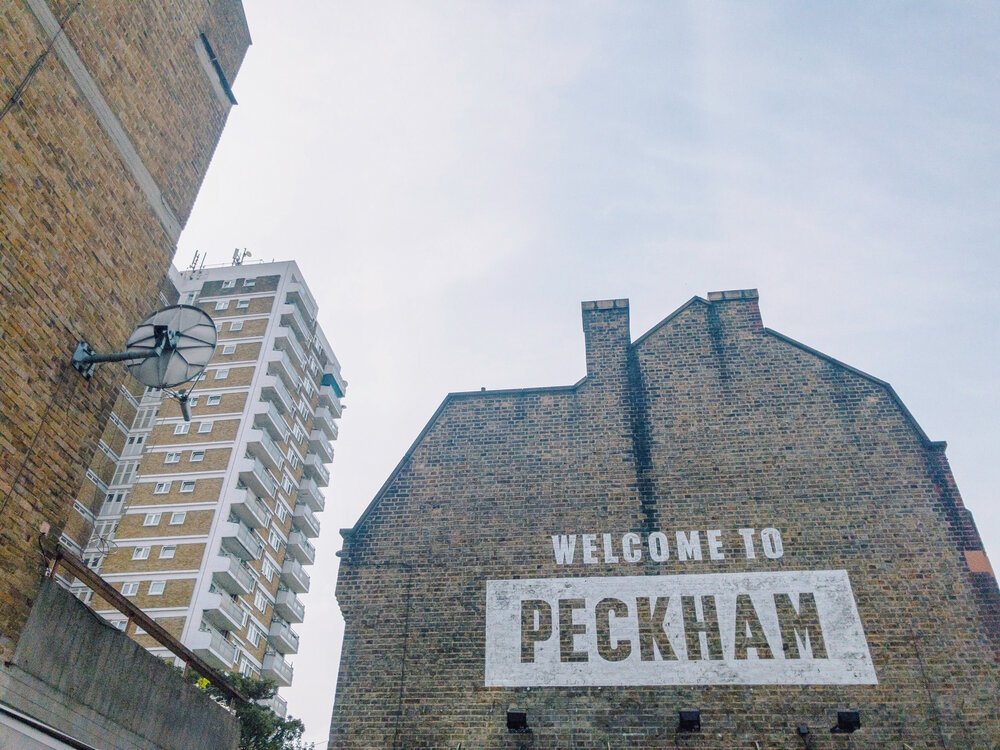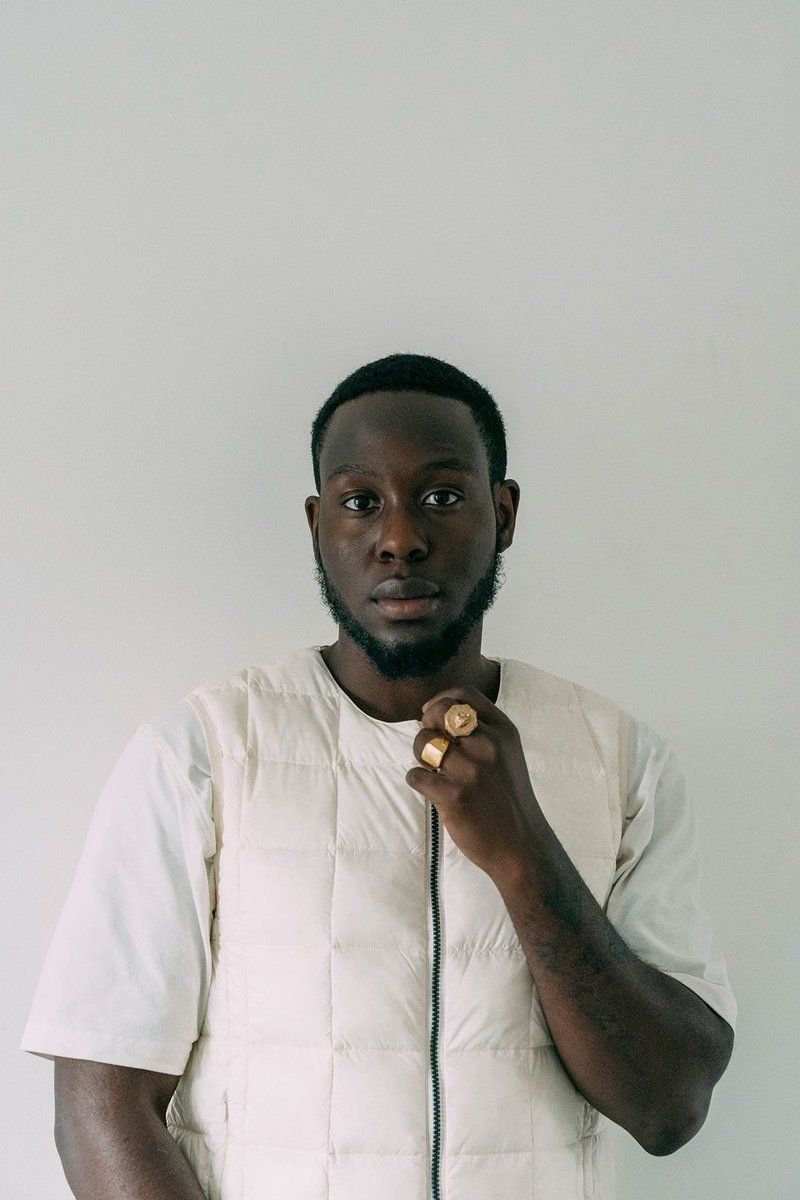Represent: reflections on Caleb Femi’s “Poor.”
T.S.J. Harling
In 2020, Caleb Femi released his award-winning debut poetry collection, Poor, reflecting on his experiences growing up on the North Peckham estate. Fellow Londoner T.S.J. Harling offers her own reaction to the poet, filmmaker, photographer and former young people’s laureate for London.
What a thing it was, to be nearly forty, having been an avid reader from childhood, and to finally find, for the first time, my home, a deprived council estate in inner-city southeast London, represented in poetry. Immersed in my nineteenth-century critical-creative doctoral thesis, being a bookish white girl who is upwardly socially mobile, when I read Femi’s prize-winning collection of poetry Poor, I couldn’t articulate the impact the book had on me. Half a year later, this piece of writing is an attempt to articulate that impact.
It’s likely that Femi and I might have passed each other on the street, sat next to each other on the bus. We could have gone to the same school. I grew up in Deptford, a kind of less sexy cousin to Peckham, where Femi’s poems are mostly located. Deptford and Peckham each have a popular high street that is not technically pedestrianised but feels as if it is. New Cross sits in between the two areas, with a multitude of buses channelled in between. Both areas have been subject to gentrification; once abhorrent working-class no man’s land, now fashionable places to open a wine bar or restaurant for the middle-class people who have the capital to invest. A few decades ago, this would have seemed unimaginable; and Femi unreservedly reminds the reader of the brutality of poverty that has shaped the endz. A brutality that has not miraculously disappeared, just hidden by the sky-rocketing house prices, disguising the food banks.
*
Femi dedicates his poem “How to pronounce: Peckham” to Damilola Taylor, a name once known to all Londoners, and beyond, when he was killed at the painfully young age of ten. That name we mourned. The name of the boy that now feels unmentionable, as if harking back to a bad war we are all ashamed of. Doesn’t seem to fit right, against the rooftop bars of Frank’s and the Chronic Love Foundation rt Lounge. And that’s not to criticise these places; I try to book tables there on Saturday nights too. Femi puts Damilola Taylor back into the discourse. While we’re partying a few streets away, Femi speaks of the mortality of forgotten black boys, boys robbed of their chance to become men.
yet the East Wing stairs were where Damilola was found.
blue dawn, blue body, blue lights, blue tapes.
*
In A Designer Talks of Home / A Resident Talks of Home, Femi overlays one viewpoint of Peckham over another, demonstrating the literal and figurative ways in which the poor have been silenced and buried, bulldozed to make space for market forces. Even by using the word ‘poor,’ by emblazing it as the title of his book, Femi announces without apology the lived reality of poverty in the present, not in a Dickensian past. The literati tend to say, ‘working-class’ or ‘low-income’. Femi writes one bedroom and seven bodies making do.
*
In Thirteen, Femi depicts being racially profiled while barely in his teens. In Coping, he encapsulates the fear that black boys feel when playing out, when the rest of the world pretends to be scared by them, Dark skin boys scare everything in the dark / though really / we’re just trying to scare away the dark. Meanwhile, the BBC London news portrays these young people only through tales of knife crime and gangs, without thinking about what it might be, to be black and British and a boy, walking to school or home, through the inner city, with no-one to protect you apart from your own self. The vulnerability. I am exhausted by the BBC’s continuing charade that black masculinity can only be represented through violence. It is a lie.
*
Femi writes of riots, of teenage love, of concrete.
*
Femi’s poetry is site-specific, while at the same time, universal. Many of us have felt that sense of having grown away from our surroundings, and the disconcerting feeling upon return.
I crossed over
& now the hood won’t take me back.
I stink of uptown, high ceilings, grand windows
they know that I room in the belly of the bourgeois
There was a time in my youth when every single person I knew took drugs, apart from my mother. When everyone I socialised with was always on them, and there was a crack house next door. I was always masking my abstinence from drug consumption with booze, jokes about getting high from the fumes around me and generally creating a bit of a scene.
Now they let me in the room
with strict instructions:
no laughing
no dancing
nothing to be passed my way
no yak
no blunts
Being (sort-of?) a social climber myself, I too know how it feels to not be passed the blunt anymore. No-one would dream of it now. While Femi doesn’t need my identification with his works, you, reader, should bear in mind that even if you didn’t grow up in the endz, that Femi’s work both centres and transcends southeast London, that the heartbreak and social housing and poetics in this volume are truly great and should be canon, even if canon is an antiquated way to express it.
*
Femi should be required reading for GCSE students. When I took mine in the late nineties, they put Ian McEwan’s Enduring Love on the exam. And then they wonder why the take-up of the subject is continues to fall.
Caleb Femi
Femi gives us, in his photography; bodies and blocks, the geometry of the council estate, the racial trauma but also the joy in the endz. Women laughing. Ravers. Style. Proud portraits, parties. Femi is interdisciplinary, rejecting the genre-specific paradigms art is usually shoved into to hit sales targets. Femi is radical. It’s radical to offer spoken word poetry for a Heathrow promotional video (outside this particular collection) and state that We don’t all sound like Downton Abbey / Not all Northerners speak like Wayne Rooney and to actually tell the listener to teach your ears the different accents.
*
I have walked the deliberately and carelessly unnamed streets of the estates, I have crossed the A roads to get to the KFC, I have stared up at block after block after block. I cannot speak to racial trauma, but I have, I think, been a witness to it. When I read Femi’s great first collection of poetry, I tremble at the genius, and tear up at the sight of his testimonial.
*
The injustice of the silencing burns. I’m not just moved, personally, by the power of his poems. Nor is it just that I am intellectually impressed by his sophistication. I’m angry. I’m angry that this is the first time I’ve seen southeast London in verse.
*
I wanted to offer a proper literary analysis of Femi’s work. Please, someone with more objectivity, read Poor, and write of his couplets, his syntax, his reformulation of Bible psalms, his deft manoeuvring through modes, his contrasting use of the vernacular. Please write much more than I have done here. This is not a story I can tell. My heart keeps getting caught in my throat.
T.S.J. Harling’s fiction and non-fiction has been published in numerous online journals including Square Wheel Press, Olit, Queen Mob's Tea House and XRAY. . Based in south east London, England, Harling is currently studying for a Critical & Creative Writing PhD at the Royal Holloway, University of London, on the 'New Woman' in Dracula. Harling’s print chapbook, Tower Block Ghost Story, is out with Nightjar Press now.





